I know it’s no great scoop or anything, but this iteration of Gegege no Kitarou is really good. I don’t know if I’m going to keep blogging it into summer, because it doesn’t seem to generate a lot of interest among the readership here, but based on merit alone it would certainly be a keeper. It’s always good to see a treasured old franchise get a respectful updating, and this one goes beyond respectful – you can tell that this is actually a show Toei is passionate about (and that certainly isn’t always the case with them).
Technically the episode of Kitarou kicks off the summer season, in fact – it’s the 14th, and features a new ED. It should prove an interesting season for the series, as Sawashiro Miyuki announced this week that she’s going out on maternity leave, which means that Kitarou (among other roles) is going to have to be re-cast for some number of this season’s episodes. I’m sure I don’t need to remind Ogawa Kouji or his team, but if they’re looking for a replacement they have someone with very relevant experience close at hand…
This episode was another dark and unnerving winner, focusing on a boy named Masashi whose father – after threatening him with a bottle for disturbing his slumber – falls into a deep sleep and won’t wake up. Mana asks Kitarou to help, and being the amateur sleuth she’s become she tells him that numerous adults seem to have suffered a similar fate. Medama-oyaji immediately suspects dreams are involved, which in turn makes him immediately suspect Makura-Gaeshi (Iwasaki Hiroshi, recently Bacchus in the Bahamut series), who has a history of trying to lure people (children, in his case) into the dream world. He’s not behind this incident, but Mana skillfully manipulates him into helping find out who is behind it.
That turns out to be a little girl who was sacrificed to a river God at some point in the distant past, and having come into possession of the Bell of Dream Control thanks to her father’s final bequest to her, lures despairing adults (like Masahi’s father) into the dream world to forget their troubled lives and play with her. While Mana and Neko-musume lose themselves in dreams about Kitarou (their respective fantasies are quite revealing) the boys set about trying to rectify the situation and rescue Masashi’s dad.
While that’s a good story, perhaps most interesting in this episode is the background we get on Medama-oyaji (which hasn’t been touched on in this version). He used to be a full person with a real body, like Kitarou, but the eyeball is all that’s left. And he’s acutely aware of the limitations this places on him as a father. When the moment comes where Makura-Gaeshi entreats Kitarou to conjure some magic via a childlike dream, Kitarou has nothing – because in truth, he’s never really had a childhood. Medama-oyaji blames himself for this of course – and it’s fascinating to hear the voice of Kitarou from so many earlier stories now baring the soul of Medama-oyaji to his son.
“Dreams must end – that’s what makes them precious.” Sage words from Daddy Eyeball, and it’s the love of fathers for sons – his, and Masashi’s dad’s – that breaks the bell of dream control and sets the dreamers free at last. This was the first episode, I believe, that didn’t feature Nezumi-otoko in some capacity, but it didn’t suffer from any narrative lag – thematically it was one of the most pointed episodes so far. That’s a strength of Mizuki-sensei as a writer that this edition of Gegege no Kitarou is highlighting beautifully – there aren’t just random youkai tales-of-the-week. There’s a theme to each of them, a point – and they manage to be simultaneously timeless and contemporary.


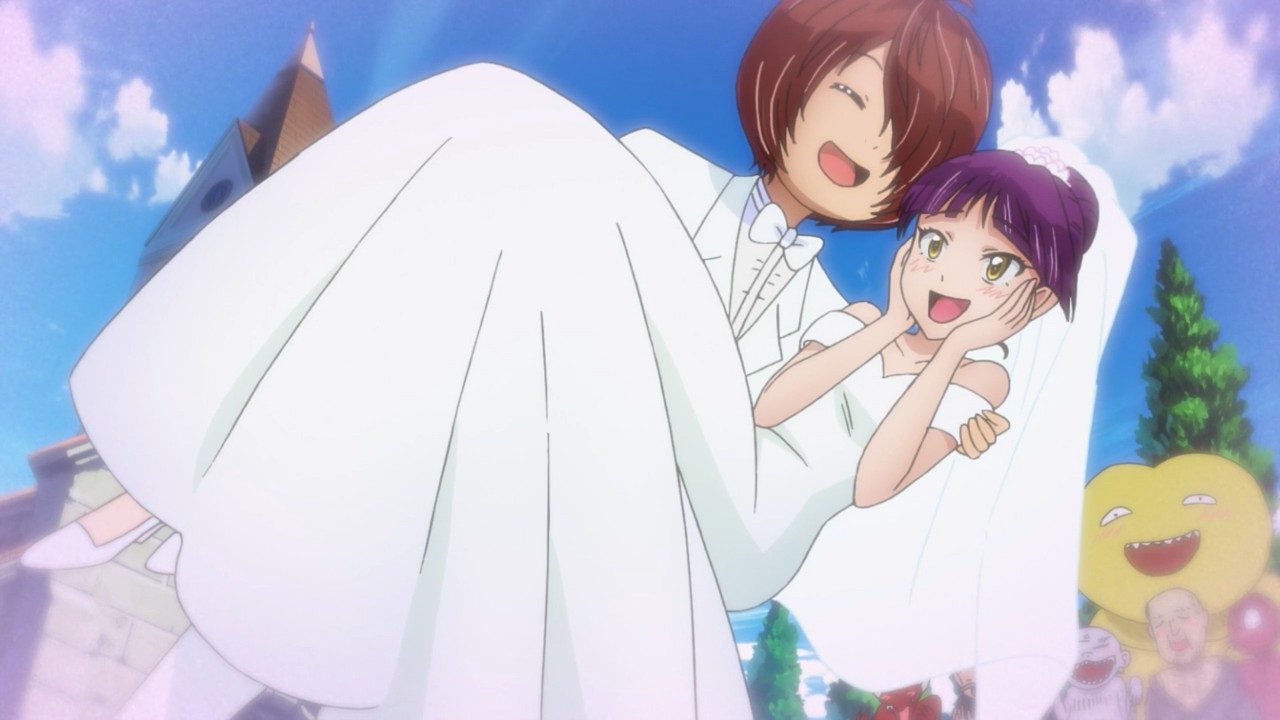
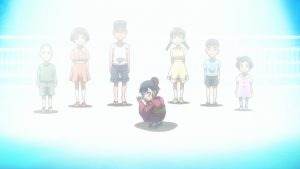
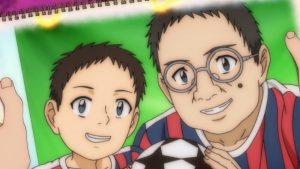
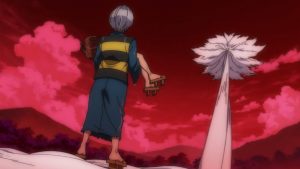
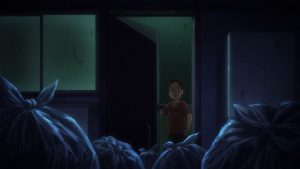
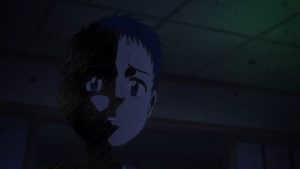
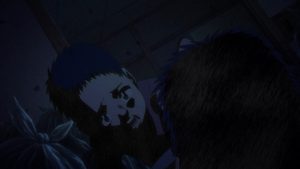
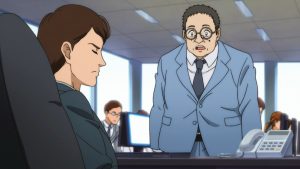
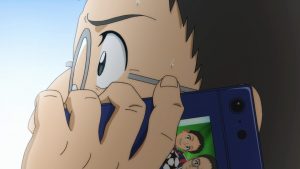

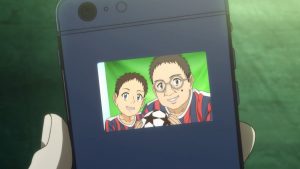
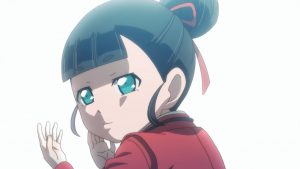
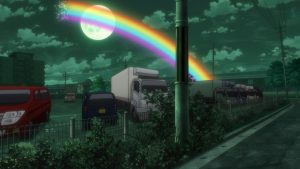
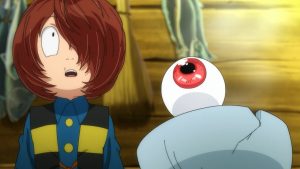
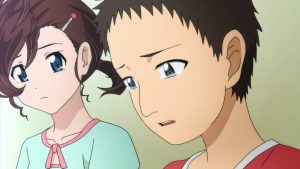
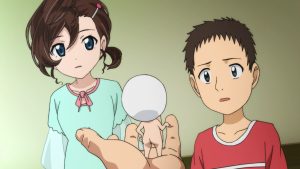
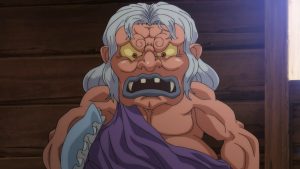
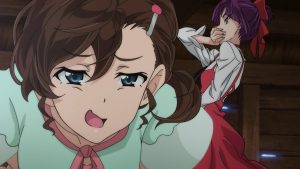


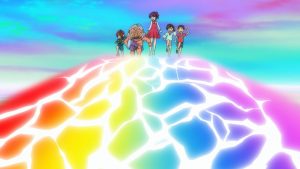
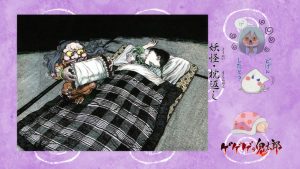

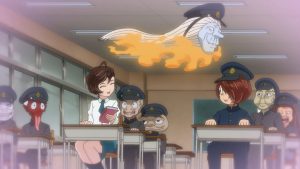

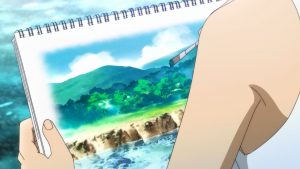
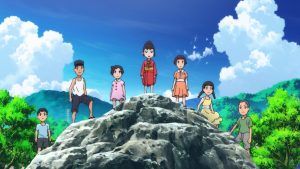
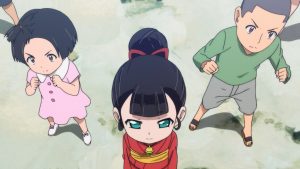
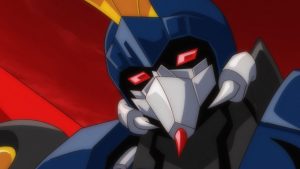
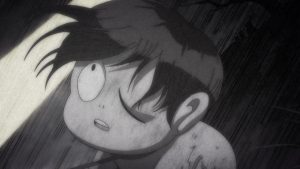
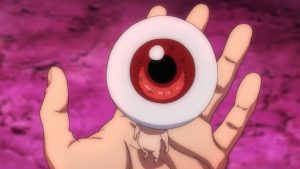

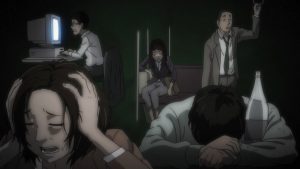
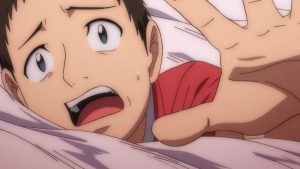
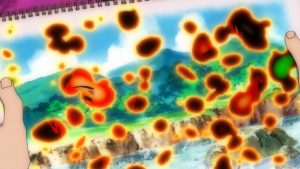
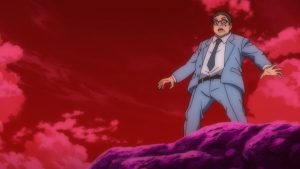
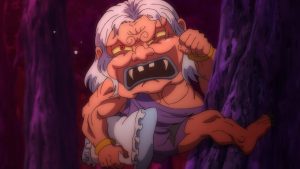
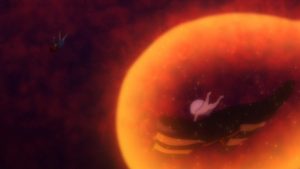

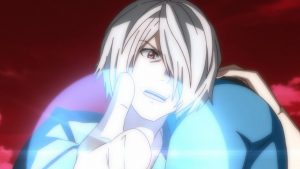
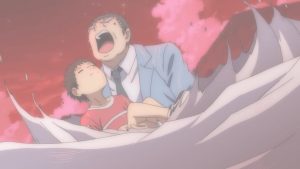
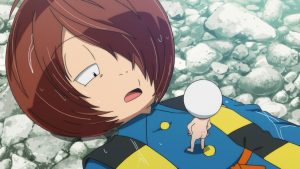
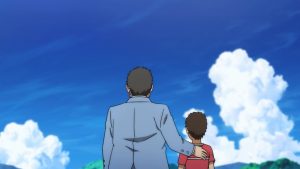
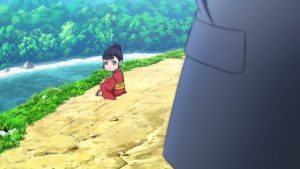
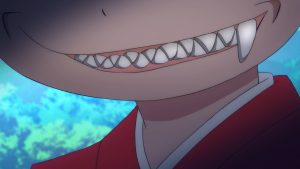
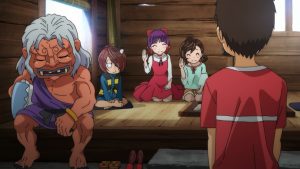
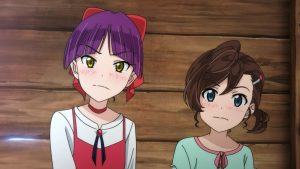
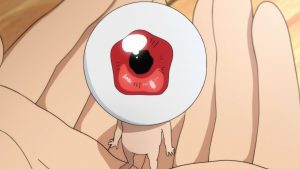

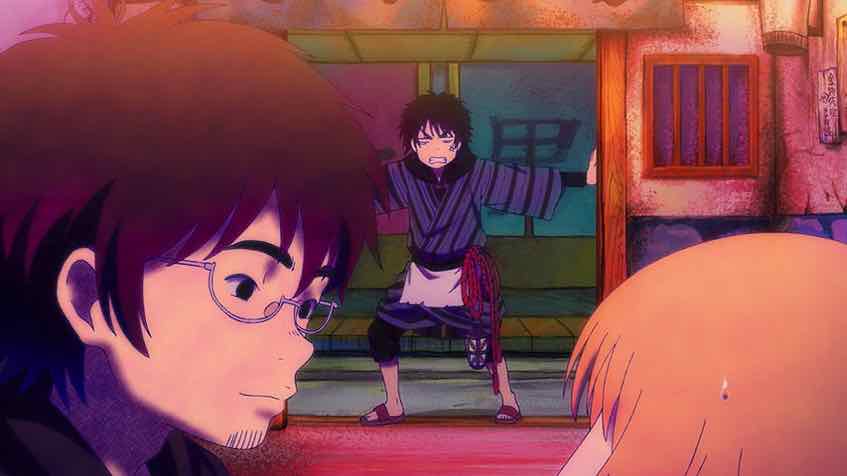
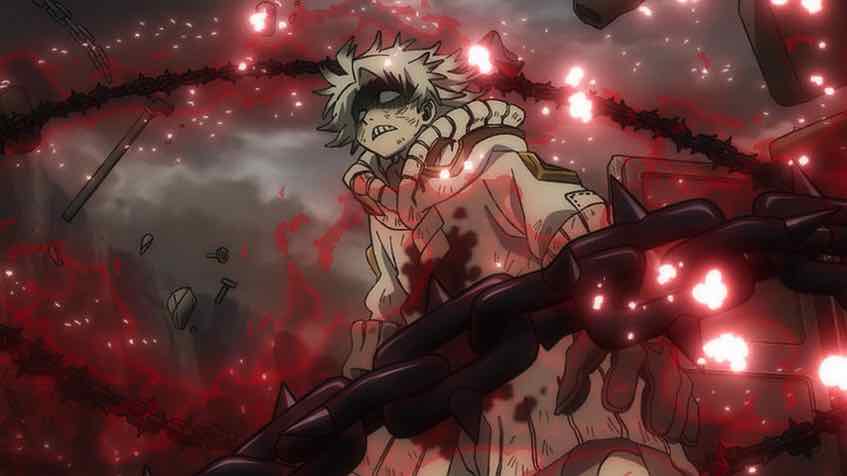
Jon
July 1, 2018 at 6:47 amHey, I’m a long-time stalker of the blog, and I would just like to thank you for your insightful commentaries on rarely talked-about anime such as this one and Kyoukai no Rinne.
As you say, there’s a lot of heart behind this iteration of Gegege no Kitaro, especially in the small directional touches. When Masashi’s Dad calls his estranged wife right after being fired, there is a small painting of a landscape with sunflowers in the center of the frame. It ends up being similar to his scene of bliss in the dream world. Quite a fascinating exploration of his psyche; I wonder what frustrations he met as a painter?
Also, each episode of Gegege no Kitaro often has an open-endedness that sets it apart from similar anime. Even though Masashi’s dad may have woken up from his dream, it is still uncertain as to whether things will get better for him. He may eventually lapse back into the dream world, and the little girl seems to foretell this with a knowing smile.
There is also a theme of frustrated childhoods connecting the little girl, Kitaro and Masashi. Only the latter’s childhood can still be changed, and it is up to his Dad to be a loving father to him despite everything. This anime never fails to awe me every week, it feels like there’s a sharp edge behind every episode.
Guardian Enzo
July 1, 2018 at 7:05 amGood to hear there’s at least one of you out there! Thanks for commenting.
I agree about the ambiguous endings – which I think is quite faithful to the manga, from what little I remember.
sonicsenryaku
July 1, 2018 at 8:14 amI would definitely commenting more on your Kitaro write-up as i do enjoy them if more people actually generated a discussion either on their own or through my comments, you know?
Guardian Enzo
July 1, 2018 at 2:25 pmPerception (kiddie series, cheap remake) probably kills this series in that respect to some extent.
Alaxis
July 1, 2018 at 8:52 amI’m also a stalker on this blog haha, and I look forward to your Kitaro posts as much if not more than I do all the other anime! It would truly be a shame if you stopped writing them… I don’t have the time to watch all the episodes, but I watched a few specific ones after reading your review, and I greatly enjoyed each one of them! I’m still waiting for the next one that’s so good I just have to watch it, seems like this one is very much up my alley
Guardian Enzo
July 1, 2018 at 2:27 pmThanks, and yes, I think this is a good one. Not the absolute best in the series so far, but top half for sure.
Magewolf
July 1, 2018 at 3:01 pmThe sacrificed girl needs to move on to Hoozuki no Reitetsu now. I am sure that she would find a lot of common bonds.
Also that fanged smile at the end made me wonder if she ate them after she got tired of playing with them.
Guardian Enzo
July 1, 2018 at 8:19 pmI think that smile was intended to be quite ambiguous. I took it more as a “you’ll be back” kind of vibe.
Paul
July 1, 2018 at 10:13 pmSo Kitaro’s dad is actually Ultra Instinct Goku’s ancestor hahaha
Aera
July 1, 2018 at 11:33 pmI’m also a stalker of your blog for quite a long time, and I always like your reviews about Gegege no Kitaro since it was a Weekly Digest. I myself have always loved Gegege no Kitaro since I watched the ’80s version in my childhood times and some episodes of previous and later adaptations. This 2018 adaptation is outstanding in my opinion, and this episode in particular is also very enjoyable, though my favorite episode remains on seventh episode. I always look forward to read your reviews about this series. It’s nice to see people outside Japan also appreciate this series. And I will try to pop up and comment to your reviews as well! I’d love to discuss series that I like with you!
Guardian Enzo
July 2, 2018 at 12:48 amAwesome – thanks for letting me know all that!
Melodie McLellan
July 2, 2018 at 10:08 amIf you want comments, here’s mine. Please write about your pleasures and perceptions, write what pleases you. Sometimes you lead me to unexpected delights – I certainly wouldn’t know Hoozuki-sama if not for you. I’m grateful for that. I am a practitioner of oriental medicine, and a poet, and it was terrific to find that Haku’s medicine has a basis that is traditionally correct. I like series like Rinne and Kitaro, that have adult consequences, but are not bogged down with ‘wink-wink’ sly fanservice. Please, be yourself, and don’t worry about commentators or boosters.
Collectr
July 2, 2018 at 12:10 pmI agree with all the other “lurkers.” Please don’t assume that lack of comments equals lack of interest. Your championing of the series that you like has led me to follow shows (like Ginga e Kickoff) outside my usual anime interest areas, yet I rarely, if ever, leave a comment. So please, continue writing about the shows that interest you. Your audience is following along.
Specifically, GeGeGe is a keeper. It’s far more than the “kids’ show” its time slot or the jolly tone of the OP would imply. I hope you will keep in in your rotation during this (potentially dreary) summer season.
Guardian Enzo
July 2, 2018 at 2:29 pmOK, OK – message received!
Yann
July 18, 2018 at 7:43 pmSame here… I think I’ve read all your GGGnK posts and I enjoy the show a lot (binged a few episodes today cause I’m sick…).
Unless you’re talking about analytics stats, please don’t think: no comment – no interest! 😀
Guardian Enzo
July 18, 2018 at 7:54 pmWell… GGGnK doesn’t exactly sing in that area either. But I’m in it for the duration now.